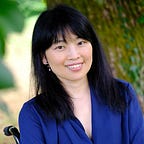Sharing Memories
“Your mother’s last moment was a sublime culmination. She gave us the gift of courage,”
said my uncle Tetsurou, my mother’s youngest brother, over a video call. He lives on the other side of the Pacific, one click away on my iphone.
“I know. She was strong and noble,”
I replied, my eyes glistening and my throat constricting. It has been a year and a half since I lost my mother to cancer, but each time I remember her last days, raw emotions erupt.
“A victorious ending,”
I whispered. Her words, movements, facial expressions, even her breathing were a gift of courage for the next generations. My uncle and I often talk late into the night about episodes of my mother’s life that we hold dear, as if we were trying to locate the source of her courage and dignity.
After my mother’s passing in 2019, I noticed many changes in how I related to myself and others. My uncle, in particular, has become more special to me. We are always changing, of course. But I wonder what subconscious need my growing relationship with him fulfills. Maybe it has to do with facing our own frail mortality.
My uncle is 20 years older than I am, but I’ve always addressed him using the “chan” ending — a Japanese term of endearment. It is unusual in Japanese to use a familiar ending, rather than an honorific ending, when speaking with someone older.
My uncle has many hobbies, including oil painting, fly fishing, wood-working, songwriting, listening to jazz, and playing guitar and drums. In my childhood, when I had art projects for school, he frequently rescued me from disaster. I am not as artistic and sensitive as my grandfather and my uncle, and I’ve always admired their spontaneity, curiosity, and gentleness. But most of all, I admire their ability to “go deep,” something I am mindful of these days.
The other day, my uncle shared a story of my mother that was new to me. One day when he was a high school student, my mother brought many grapefruits home for her family and showed them how to cut them in half and dig the segments out with a spoon. Like most Japanese at that time, because of trade restrictions, he had never seen or tasted grapefruit before. He could vividly recall how sweet it tasted.
“Ever since, every time I see grapefruits, I think of your mother. She was always at the forefront of her era — truly a modern working woman, fully independent”
Nodding and smiling, I added,
“Yeah, I can picture that scene. I wish I could have been there to meet my young mother. Oh, didn’t she love cutting-edge fashion? Remember, how many hats she had!”
We laughed. I don’t know if my mother ever knew the emotional impact she had on my uncle with her grapefruits. Some moments last a lifetime.
Apropos, I had a similar experience with my uncle. As a child, in our disciplined household, I was not permitted to watch TV on weekdays. But there were occasional exceptions. One evening, my uncle called my mom to tell her that the movie “The Sound of Music” was on TV, and we should watch. We did! I was about 10 years-old and remember how excited I was and how strong a bond I felt with my uncle. Ever since, when I watch The Sound of Music, my memory of that phone call comes flooding back.
Both moments share some commonalities. Neither my mother nor my uncle acted with strategic foresight; they simply wanted to bring joy to others. They were acts of love. And both moments acquired strong emotional resonance from the way they broke expectations.
During the three years between her diagnosis and her death, my mother never showed any worry, remaining calm and positive. She continued the Hawaiian dancing she loved, managed the neighbourhood association, cared for her family, and periodically sent food packages to me in Canada. She even visited me in Vancouver, cooked for us, and performed Hawaiian dance for my friends. She was a rock, even when her cancer metastasized and her symptoms became worrisome. By contrast, I was flustered and fearful, as if the cancer were my own.
“Mother, aren’t you afraid?”
I asked so many times. She always smiled.
”Don’t worry. I won’t give up; I want to be there for my family.”
And she kept her promise to the last moment.
“Life can only be understood backwards, but it must be lived forwards,” said Søren Kierkegaard, the Danish philosopher. But as my uncle and I share our memories of my mother, I am temporally nourished, refining my present identity and sensing my future actions.
Moreover, my uncle and I are each, independently, painting a portrait of my mother and a portrait of each other. On video calls, we often show our work-in-progress, ask questions, and encourage discovery. I was surprised and delighted to learn that he has started an oil painting of me on a huge canvas. Regarding his portrait of my mother:
“I still get too emotional and cannot finish it yet.“
Recent behavioral research illuminates the overlap between episodic memory retrieval, episodic future simulation, and divergent thinking — the ability to think creatively and generate novel ideas. The results suggest that episodic processing may play a critical role in creativity. Who knows what my uncle and I are doing for each other. Coming back to my earlier question, in the process of consoling my heart, am I following a subconscious drive to open up my creativity? I think that may be the case.
Putting cause and effect aside, I await my next call to my uncle as if it were a kind of existential thirst to join my past, present, and future.
